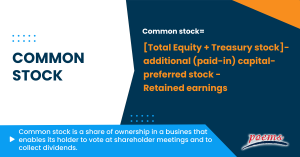Common Stock
Table of Contents
What is common stock?
Common stock is a share of ownership in a business that enables its holder to vote at shareholder meetings and to collect dividends.
Upon payment of all creditors and preferred shareholders, the common stockholders receive their proportionate part of the liquidation profits in the event of corporate dissolution.
When an investor owns the common stock of a company experiencing financial difficulties, this low level of liquidation preference might provide a risk of losing money. However, the majority of the gains flow to common owners when a corporation is profitable.
In many places, the law mandates that each share of common stock be allocated a par value. Technically, par value is the minimum price below which a share of stock cannot be sold. In actuality, par value is typically established at the lowest feasible amount, and in certain places it is not even required by incorporation law. Thus, par value is irrelevant in most circumstances.
In the equity portion of a company’s balance sheet, the dollar amount of common stock recognized by the corporation is listed. The quantity of common stock recorded by a firm is divided between the common stock account and the extra paid-in capital account; the total amount recorded corresponds to the price at which the business sold shares to its investors.

Common Stock Formula
Common shares are shares that may be purchased on the stock market, including those held by institutional investors and business officials (insiders) who own a firm. To calculate common stock, there is a special accounting formula: the number of issued shares minus the number of treasury shares equals the number of outstanding shares of common stock.
Common stock= [Total Equity + Treasury stock]-additional (paid-in) capital-preferred stock-Retained earnings
Common Stock Example
Common shareholders are entitled to specific privileges within the company. According to their share of ownership, they have the opportunity to vote on business affairs and for board members.
Common shareholders also have the right of first refusal to keep their percentage of ownership. For instance, if the firm is attempting to expand its operations by issuing more stock, the one percent owner has the right to purchase extra shares in order to keep his one percent ownership before other investors may acquire it.
The right to earn dividends is one of the several benefits of being a common investor. It is not the right to announce dividends, but the right to receive them when they are declared. Dividends are the distribution to shareholders of retained earnings. It is a return on their investment in the organization. When the board of directors declares dividends, common shareholders have the right to receive a proportion of dividends payable to common stock that corresponds to their ownership stake in the firm.
Features of the Common Shares
- Stocks Represent Ownership
Common stock represents ownership in a corporation. One share is a fractional ownership stake proportional to the number of outstanding shares. If a corporation issues 100 shares of stock and an investor purchases 10 shares, the investor would control 10 percent of the company. Companies in the real world issue millions, and sometimes billions, of shares. However, each one represents a proportional piece of the company’s stock.
- Voting Rights
The majority of common stocks have voting rights attached to them. Shareholders elect directors, who then select management accountable for the business’s direction. When a firm is involved in a merger or acquisition, shareholders frequently exercise their voting rights to voice their thoughts on the transactions.
- Common Share Price
Theoretically, stock prices have no ceiling. In contrast, the value of a company’s stock shares might reach zero, rendering them useless. The dividend payout is one of the appealing features of common stocks. Numerous corporations distribute dividends to investors on a regular basis. This indicates the owner’s portion of earned earnings. In the event that a firm must liquidate or declare bankruptcy, the owners receive whatever is left over after creditors and bondholders are paid.
- Common Bond Characteristics
The bonds issued by corporations, government agencies, and municipalities reflect loans made by bondholders to a firm or organization. The contract accompanying a bond issuance describes the issuer’s duties to bondholders and the issue’s specific characteristics, such as the interest rate.
- Transformable and Callable
Some corporate bonds may include a clause allowing the bondholder to exchange the bond for a specific number of shares of the company’s stock. A bond may also be callable, which means that the issuer might require the bondholder to redeem prior to the maturity date.
- Bond Rates, Maturity and Value
Bond investors do not get dividends in the form of corporate earnings; instead, they receive a coupon rate, which is a set return. Bonds contain an expiration date, also known as the maturity date, which is the day on which the principal is repaid to the investor. The principal is based on the bond’s par, or face value. When estimating future interest rate payments, bond prices are often known beforehand. Nonetheless, bond prices are susceptible to credit risk based on the issuer’s financial health and are influenced by inflation and market interest rates.
Advantages of issuing common stock
- Performance
Compared to bonds and deposit certificates, the performance of common stocks is superior. However, there is no cap on the investor’s profits from their ownership of common stock. Consequently, common stocks are less costly and more practical alternatives to debt investments.
- Electoral rights
An investor receives one voting right for each share of common stock held. These voting rights enable investors to participate in the making of company decisions and corporate policy.
In certain instances, investors can elect the board of directors by exercising their voting rights. The more common stock an investor has, the greater influence he will have over a company’s policy.
- Liquidity
Due to their liquidity characteristics, investors may simply surrender or invest common stocks. Thus, these stocks enable investors to purchase shares and withdraw their whole investment if the firm fails to meet their expectations.
Liquidity gives investors the freedom to use their capital as they see appropriate without difficulty.
- Limited Legal Liabilities
The responsibility of common shareholders extend beyond the financial investment events that occur within the corporation, and they must be concerned with all legal liabilities.
When a corporation provides increasing returns over time, ordinary shareholders are in a sense passive beneficiaries of a fixed income.
Passive shareholders are not liable in the event that the firm liquidates or encounters legal issues.
Disadvantages
- Market Risks
The principal risk associated with common stock is market risk. Market risk is the possibility that a firm will underperform over time.
A significant fall in the company’s performance might result in the shareholders consuming the profit and not receiving the dividends they desire.
This is a key criterion to examine since, even when the firm is functioning very well, common shareholders are not the only or first to earn dividends.
- Uncertainty
Even while ownership of common stock might be considered a fixed-income investment, there is no assurance of dividends. The significant distinction, however, is that the revenue is not guaranteed at the expected time and dependent on the availability of cash in the corporation and how those funds are allocated.
When the corporation begins to distribute dividends, investors and ordinary stockholders are not the only recipients of instant payments.
They get dividends after shareholders and bondholders have received their entire dividend entitlement. Therefore, there is an element of unpredictability and lack of control over the profitability of common stocks.
Frequently Asked Questions
The primary distinction between preferred and common stock is that preferred stock does not grant stockholders voting rights, but common stock does. Preferred shareholders get dividends before regular shareholders because they have preference over a company’s profits.
- Preferred stock
- Domestic stock
- International stocks
- Large-cap stocks
- Mid-cap stocks
- Small-cap stocks
- Growth stocks
In the event of a firm liquidation, common stock and preferred stock rank below debt holders as creditors who would get assets. Both common stock and preferred stock represent equity ownership. They gain ownership rights in the corporation, including voting and dividends.
Short-term investors who are unable to hold ordinary stock long enough to overcome share price declines may benefit from investing in preferred stock. This is because preferred stock tends to vary less than common stock, but it also has less potential for long-term gain.
Related Terms
- Market maker
- Options expiry
- Payment Date
- Treasury Stock Method
- Reverse stock splits
- Ticker
- Restricted strict unit
- Gordon growth model
- Stock quotes
- Shadow Stock
- Margin stock
- Dedicated Capital
- Whisper stock
- Voting Stock
- Deal Stock
- Market maker
- Options expiry
- Payment Date
- Treasury Stock Method
- Reverse stock splits
- Ticker
- Restricted strict unit
- Gordon growth model
- Stock quotes
- Shadow Stock
- Margin stock
- Dedicated Capital
- Whisper stock
- Voting Stock
- Deal Stock
- Microcap stock
- Capital Surplus
- Multi-bagger Stocks
- Shopped stock
- Secondary stocks
- Screen stocks
- Quarter stock
- Orphan stock
- One-decision stock
- Repurchase of stock
- Stock market crash
- Half stock
- Stock options
- Stock split
- Foreign exchange markets
- Stock Market
- FAANG stocks
- Unborrowable stock
- Joint-stock company
- Over-the-counter stocks
- Watered stock
- Zero-dividend preferred stock
- Bid price
- Authorised shares
- Auction markets
- Market capitalisation
- Arbitrage
- Market capitalisation rate
- Garbatrage
- Autoregressive
- Stockholder
- Penny stock
- Noncyclical Stocks
- Hybrid Stocks
- Large Cap Stocks
- Mid Cap Stocks
- Preferred Stock
- Small Cap Stocks
- Earnings Per Share (EPS)
- Diluted Earnings Per Share
- Dividend Yield
- Cyclical Stock
- Blue Chip Stocks
- Averaging Down
Most Popular Terms
Other Terms
- Direct market access
- Deficit interest
- Strong order book
- Economic calendar
- EPS forecast
- Fiat money
- Adjusted distributed income
- International securities exchanges
- Settlement currency
- Federal funds rate
- Active Tranche
- Convertible Securities
- Synthetic ETF
- Physical ETF
- Initial Public Offering
- Buyback
- Secondary Sharing
- Bookrunner
- Notional amount
- Negative convexity
- Jumbo pools
- Inverse floater
- Forward Swap
- Underwriting risk
- Reinvestment risk
- Final Maturity Date
- Secondary Market
- Margin Requirement
- Mark-to-market
- Pledged Asset
- Yield Pickup
- Subordinated Debt
- Trailing Stops
- Stochastic Oscillator
- Bullet Bonds
- Basket Trade
- Contrarian Strategy
- Exchange Control
- Notional Value
- Relevant Cost
- Dow Theory
- Speculation
- Stub
- Trading Volume
- Going Long
- Pink sheet stocks
- Rand cost averaging
- Sustainable investment
- Stop-limit sell order
- Economic Bubble
Know More about
Tools/Educational Resources
Markets Offered by POEMS
Read the Latest Market Journal

继前一篇我们介绍了越南市场后,接下来我们将介绍泰国市场,泰国的表现一样引人瞩目。 受结构性问题影响,相较于菲律宾、马来西亚、印度尼西亚和越南,2023年,泰国全年GDP增幅远低于其他国家。泰国2023年GDP同比2022年增长1.9%,低于市场预测的2.5%。 2023年,中国-东盟自贸协定零关税给泰国带来了直接且沉痛的打击。由于消费疲软、贸易壁垒等政策影响,产能过剩,导致大量低价进口中国商品涌入,使得2023年泰国与东盟9国的总贸易额出现了3年来的首次下滑,其总贸易额为4万亿泰铢(约1489亿新元)。由于巨大的成本价格差异,其中泰贸易逆差扩大至1.29万亿泰铢(约480亿新元)。其中,小家电、蔬果、箱包和服装行业处境最为艰难。 尽管如此,旅游业的复苏增长带动了非农业产业的增长。政府数据显示,2023年来访泰国的总人数达3.15亿人次,较去年增长40.3%。其中,国际游客超过2800万人次,马来西亚和中国为最大客源。随着泰国对中国和哈萨克斯坦实施免签政策和其他活动措施,预计2024年将带来更多游客,推动泰国旅游业的复苏进程,并力争实现2024年旅游营业收入达到3.5亿泰铢(约0.12亿新元)的目标。 热销股票 1. ADVANCED INFO SERVICE PUBLIC CO., AIS,AIS通信(ADVANC.TH) AIS通信是泰国的最大移动运营商,主要经营三大业务线,包括移动业务、AIS Fibre品牌下的高速家庭宽带业务,以及企业业务。同时AIS也提供多样化的数字生活服务。AIS通过数字智能基础设施、跨行业合作和人力资本与可持续发展这三方面,致力于“成为泰国最受尊敬的认知科技公司”的愿景。 (来源:AIS2023财年年报)...

指数差价合约是区别于投资个股、指数期货或交易所交易基金(ETF)的一种热门替代品,因为该工具允许您获得特定指数的风险投资组合,并从柜台价格走势中获益,无论做多或做空。此外,由于差价合约的杠杆特性,交易者只需拿出合约价值的一小部分作为初始合约的抵押品即可启动一笔合约。这样,交易者就可以方便快捷地进行整个市场的交易。 本期重点摘要: 股票指数只是一组资产的集合,它概括了股市中某一行业板块的表现。许多此类指数根据不同的标准包含和/或排除某些股票。 指数差价合约有助于利用构成单一指数的各种股票分散您的投资组合、实现投资组合多样化。这也有助于避免 “选择悖论”:指数帮助您决定投资哪些股票。 最重要的是,指数差价合约让交易者获得对指数的接触,而不用购买组成指数的个股。这种具有成本效益的策略让您只需交易指数的价格变化,而无需拥有相关指数本身。 什么是股票指数? 当人们说 “今天市场上涨了 “或 “市场下跌了 “时,你会不会好奇,分析师是如何评估整个市场? 这很简单,他们只需分别将按照今天的报价和昨天的报价购买所有公司所需的金额相加。两相比较下,如果发现今天的数字大于前一天的数字,那么我们就知道今天的市场上涨了,反之亦然。然而,数字的汇总和对比可能会很繁琐和麻烦。创建指数就是为了方便测量。 因此,”股票指数 “一词指的是一组股票(或其他资产)的集合,它提供了股票市场特定部分表现的概况。该指数被用作一个替代指标,用来衡量市场在特定时间段内的涨跌情况,比如以上例子中所描述的逐日指数。...

本文旨在为中级外汇交易者提供必要的信息和知识。它将涵盖我们上一篇文章 “五分钟看懂世界上最活跃的市场-外汇差价合约(FX CFD)...

解锁台湾股市的投资潜力!深入了解由强大的技术驱动型经济推动的股票市场,2023 年机械和电气设备将占出口的 69%。在政治稳定、投资者友好的法规和健全的法律框架下,探索台积电和富士康等全球顶级企业。台湾股市值得称赞的历史表现和在国际贸易中的的重要性使其更具吸引力。在这个科技实力雄厚、经济稳定、充满活力的股票市场中,抓住增长机遇!

了解外汇市场 外汇交易市场又称外汇市场,是一个买卖货币的全球性金融市场。它是全世界规模最大、流动性最强的金融市场,每日交易量超过 6 万亿美元。但外汇市场有一个重要却常被忽视的一点,就是它受交易心理的影响。在本文中,我们将探讨外汇市场的复杂性,还有把重点放在交易心理与传统交易策略共同发挥的关键作用...

五分钟看懂世界上最活跃的市场 -外汇差价合约(FX CFD)
外汇交易市场俗称外汇或外汇市场,是全球金融市场的支柱。它是世界上最活跃的市场,2022 年 4 月,全球交易额达到创纪录的每天 7.5 万亿美元[1] 。这个活跃的市场为交易者提供了利用货币价格波动赚取利润的机会。在本文中,我们将解释外汇市场的基本原理,助您了解其投资机制。 什么是外汇? 外汇市场是一个分散的全球市场,世界上所有货币都在这里进行交易...






















